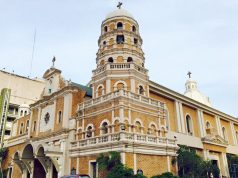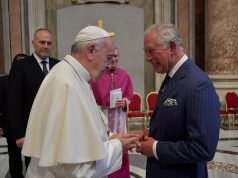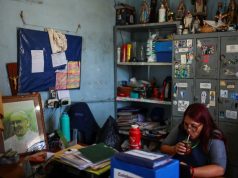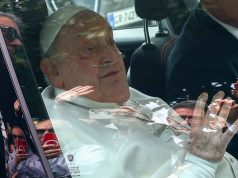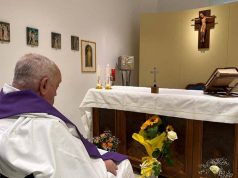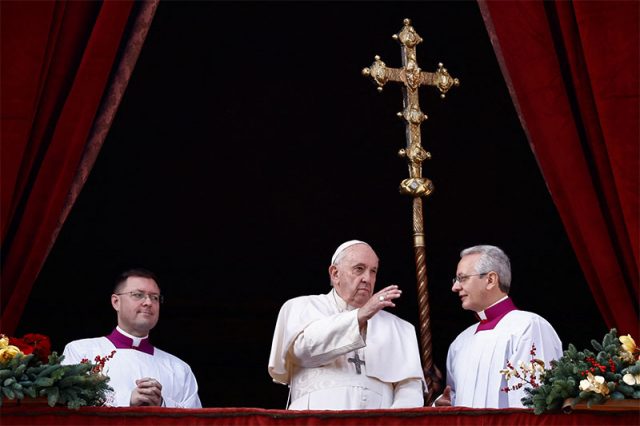
VATICAN— In his Christmas Day blessing, Pope Francis prayed that leaders will listen to the “cries of the Prince of Peace” and bring an immediate end to the war in Ukraine and “the other theaters of this third world war.”
Speaking from the central balcony of St. Peter’s Basilica on Dec. 25, the pope offered the traditional “Urbi et Orbi” (to the city and the world) blessing, praying that the Lord will “enlighten the minds of those who have the power to silence the thunder of weapons.”
“If we want it to be Christmas, the Birth of Jesus and of peace, let us look to Bethlehem and contemplate the face of the Child who is born for us. And in that small and innocent face, let us see the faces of all those children who, everywhere in the world, long for peace,” Pope Francis said.
“Let us also see the faces of our Ukrainian brothers and sisters who are experiencing this Christmas in the dark and cold, far from their homes due to the devastation caused by ten months of war. May the Lord inspire us to offer concrete gestures of solidarity to assist all those who are suffering, and may he enlighten the minds of those who have the power to silence the thunder of weapons and put an immediate end to this senseless war!”
As the world celebrates the birth of the Prince of Peace, humanity is experiencing a “grave famine of peace,” the pope said.
The “Urbi et Orbi” blessing — which refers to the pope’s dual roles as bishop of Rome and head of the global Catholic Church — is reserved for the most solemn occasions, such as Easter, Christmas, and the first public appearance of a new pope.
In this year’s Christmas “Urbi et Orbi” address, the pope highlighted specific conflicts around the world, beginning with Ukraine, noting that the war has far-reaching consequences, “putting entire peoples at risk of famine, especially in Afghanistan and in the countries of the Horn of Africa.”
Pope Francis also mentioned Syria, where he said that the conflict has “receded into the background but has not ended.”
“Let us think too of the Holy Land, where in recent months violence and confrontations have increased, bringing death and injury in their wake. Let us beseech the Lord that there, in the land that witnessed his birth, dialogue and efforts to build mutual trust between Palestinians and Israelis may resume,” he said.
The pope also asked the Christ Child to help Lebanon and to “sustain all the Christian communities living in the Middle East.”
He called for “an end to all bloodshed” in Yemen, Myanmar, and Iran, and prayed for “the light of Christ to illumine” the Sahel region of Africa, where “peaceful coexistence between peoples and traditions is disrupted by conflict and acts of violence.”
Pope Francis said that he was also thinking on Christmas day of the people of Haiti, “who have been suffering for a long time.”
He urged “political authorities and all people of goodwill in the Americas to attempt to calm the political and social tensions experienced by various countries.”
After delivering his message, the pope recited the Angelus. Putting on a dark red embroidered stole, he then gave his blessing, which carried with it the possibility of a plenary indulgence, not only for pilgrims gathered in St. Peter’s Square but also for those who “piously follow” the ceremony remotely.
Plenary indulgences remit all temporal punishment due to sin. They must be accompanied by full detachment from sin, as well as sacramental confession, the reception of Holy Communion, and prayer for the pope’s intentions once it is possible to do so.
“Brothers and sisters, let us turn our eyes to Bethlehem, and listen to the first faint cries of the Prince of Peace. For truly Jesus is our peace. The peace that the world cannot give, the peace that God the Father has bestowed on humanity by sending his Son into the world,” Pope Francis said.
“Saint Leo the Great summed up the message of this day in a concise Latin phrase: Natalis Domini, natalis est pacis: ‘the Lord’s birth is the birth of peace’ (Serm. 26, 5). Jesus Christ is also the way of peace. By his incarnation, passion, death and resurrection, he has opened the way that leads from a world closed in on itself and oppressed by the dark shadows of enmity and war, to a world that is open and free to live in fraternity and peace. Brothers and sisters, let us follow that road!”




